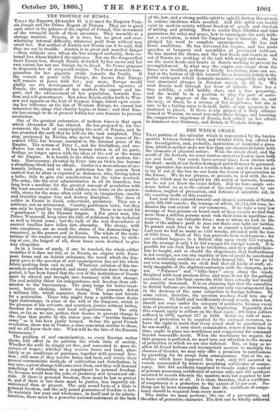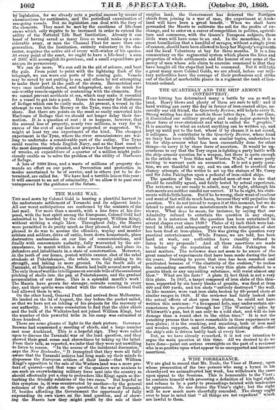THE WRECK CHART.
THAT portion of the calendar which is represented by the twelve months between October 1859, and October 1860, has offered for the investigation, and, probably, instruction of mankind a ques- tion, which is neither more nor less than our chances in battle with the elements of physical nature. With the wreck chart, and the result of the harvest, we must confess ourselves beaten upon both sea and land. Our coasts have several times been strewn with the dead ; much of our food is destroyed and will never be garnered. Our ignorance has received a terrible rebuke, and it is now for us to try if out of the loss we can learn the lesson of preservation in the future. We do not propose, at present, to deal with the re- medies which may be adopted for the safety of harvests, because we do not yet know the exact deficit. But we have ample evi- dence before us as to the extent of the suffering caused by our rashness, neglect of precaution, and defiance of scientific aid, in the coasting traffic of this country. THAT portion of the calendar which is represented by the twelve months between October 1859, and October 1860, has offered for the investigation, and, probably, instruction of mankind a ques- tion, which is neither more nor less than our chances in battle with the elements of physical nature. With the wreck chart, and the result of the harvest, we must confess ourselves beaten upon both sea and land. Our coasts have several times been strewn with the dead ; much of our food is destroyed and will never be garnered. Our ignorance has received a terrible rebuke, and it is now for us to try if out of the loss we can learn the lesson of preservation in the future. We do not propose, at present, to deal with the re- medies which may be adopted for the safety of harvests, because we do not yet know the exact deficit. But we have ample evi- dence before us as to the extent of the suffering caused by our rashness, neglect of precaution, and defiance of scientific aid, in the coasting traffic of this country.
Last year there entered inwards and cleared outwards of British ports 300,580 vessels ; the tonnage of which, 31,712,500 tons, in- dicates the vast extent of our commerce, If we take a very low average of four persons on board each of these vessels we find that more than a million persons must risk their lives in maritime en- terprise. They are valuable lives ; men to whom we look in the hour of the nation's peril to man our fleets and fight our battles. To permit such lives to be lost is to commit a national waste. Last year we had as many as 1416 wrecks, attended with the loss of 1645 lives. Much of this loss proceeds from recklessness; for one accident happens to a British ship upon every 175 voyages, but the average is only 1 in 335 voyages for foreign vessels. It is possible for our Jack Tars to be too daring, and they should there- fore be taught, and so should the shipowners, that foolhardiness is not courage, nor can any cupidity or love of profit be sanctioned which recklessly sacrifices or even risks human life. If we go to our own coasting trade we shall find that all kinds of craft, ut- terly incapable of the slightest contention with the elements, go to sea. " Palaccos" and " billy-boys" creep along the coasts freighted with most precious lives, and were it not for the gallant exertions of our life-boat crews the 1645 lives actually lost would be sensibly increased. It is an alarming fact that the casualties to British bottoms are increasing, and our only encouragement lies in the decrease of the same calamities to foreign bottoms. To some extent, therefore, the question resolves itself into one of providence. 111-built and insufficiently-found vessels, when lost, should not come under the category of accidents, because every item of precaution is set aside at the beginning. Especially does this remark apply to colliers on the East coast ; 506 laden colliers suffered in 1859, against 377 in 1858. Before we talk of mea- sures of protection to be supplied by the national resources, we have the right to insist that every vessel shall be ascertained to be sea-worthy. A very strict examination, renewed from time to time, ought to place sea-worthiness and competency for command beyond reasonable doubt. When the machinery we require for that purpose is perfected, we must turn our attention to the means of protection in which we are also deficient. But, so long as we allow ill-found bottoms and incompetent masters to multiply the chances of disaster, we may only offer 'a premium to carelessness by providing for its escape from consequences. Out of the ca-
sualties which have happened this year, only 217 occurred to vessels commanded by masters possessing certificates of compe- tency. But 344 accidents happened to vessels under the control of persons possessing certificates of service only, and 597 accidents occurred to vessels wherein the masters were not required by law to have certificates at all. It is clear, therefore, that a certificate of competency is a protection to the extent of 75 per cent. No- thing can be more reasonable than that the certificate of compe- tency should be required from every master. Two duties we must perform; the one of a preventive, and the other of protective character. The first can be wholly achieved laTleiislation, for iie-alreadv note a iiitiariiiieifeas by means of examinations for certificates, and the periodical examination of sea-going vessels. But no legislation _can deal with the fury of the elements. They must be met by the exertions of life-boat crews which only require to be increased in order to extend the utility of the National Life Boat Institution. Already it can boast of having saved- as 133.1tIlv lives as would make up a con- siderable army, or man the Chanuel Fleet for more than one generation. But the Institution, entirely voluntary in its cha- racter, requires the active aid of every well-Wisher of his species. At every point of the coast, we ought to have a life-boat ; a sum of 2001. will accomplish its.purchase, and a small expenditure per annum its permanency.
We can do more. We can call in the aid of science, and beat the gale. From point to point with the lightning flash of the telegraph, we can warn oar ports of the coming gale. Vessels may be saved by not putting to sea, and others by not attempting to make their port in the path of the storm. Barometrical sur- veys once instituted, noted, and telegraphed, may do much for sea=worthy :vessels capable of contending with the.elements. But we cannot prevent accidents at sea, which may make it essential for a vessel to get into a port. Hence the necessity for Harbours of Refuge which can be, easily made. At present, a vessel in the attempt .to run into the Aiersey or the Tyne, runs the .risk of the shore. But there are paints on the coast so easily converted into Harbours of Refuge that we should not longer delay their for- mation. It is a question of .cost ; it so happens, however, that the annual loss of property, nearly two millions, is very far in excess of the cost of any harbour .projected or suggested. We might at least try one experiment of the kind. The cheapest experiment is the Tyne, where the river commissioners are wil- ling to-undertake a considerable part of the outlay. The Tyne could -receive the whole English Navy, and as the East coast is the most dangerously situated, and always has the largest number of wrecks, an expenditure of a quarter of a million might judi- ciously enable us to-solve the problem of the utility of Harbours of Refuge. A 'loss of -1600 lives, and a waste of millions of -property de- mands an effort on our parts. Prevention and protection in -modes ascertained to be of service,-and in others--yet to be de- termined, are called for.' 'We have had a terrible lesson this year ; it-will amount to an act of criminality,lf -we allow it to pass over unimproved for the guidance of the future.



























 Previous page
Previous page